20 Feb2020
By Terrance McNeil
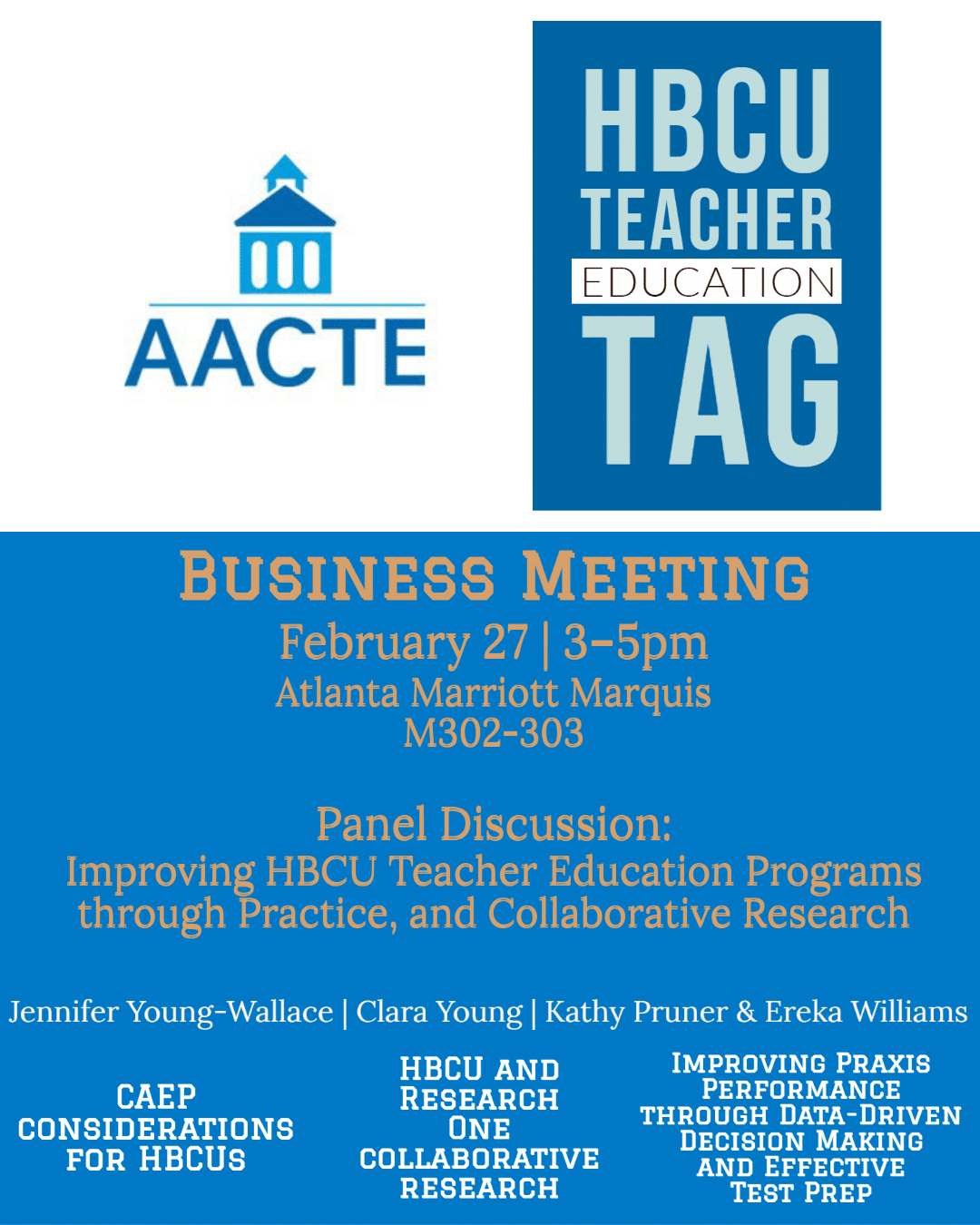 As the AACTE 72nd Annual Meeting theme suggests, decades of societal inequities extending into and from our P-16 institutional environments have left us hungry for change. Persistent achievement gap disparities and teacher shortages trouble us and often make us wonder how we will achieve the changes we seek. In terms of teacher diversity, one solution that many have found are the Educator Preparation programs at Historically Black Colleges and Universities (HBCUs). While making up only 3% of the nation’s higher education institutions, HBCUs provide over 50% of the nation’s African American teachers.
As the AACTE 72nd Annual Meeting theme suggests, decades of societal inequities extending into and from our P-16 institutional environments have left us hungry for change. Persistent achievement gap disparities and teacher shortages trouble us and often make us wonder how we will achieve the changes we seek. In terms of teacher diversity, one solution that many have found are the Educator Preparation programs at Historically Black Colleges and Universities (HBCUs). While making up only 3% of the nation’s higher education institutions, HBCUs provide over 50% of the nation’s African American teachers.
Several research projects and partnerships on the district and institutional level are demonstrating the capacity for HBCUs to bring their unique positionality to bear in the broader conversation on teacher diversity. A recent project involving Virginia Commonwealth University and Tennessee State University bears the potential to help the academic community understand more about creating a culturally responsive teacher workforce. Similarly, the “Call Me Mister” program and the “Florida Fund for Minority Teachers” historically have involved HBCUs in recruiting African American teachers. Through a variety of works, HBCUs continue to improve on their capacity to influence the teacher diversity conversation.
This year’s HBCU Teacher Education Topical Action Group (TAG) Business Meeting, which will take place February 27 at 3:00 p.m, will bring together AACTE members with over two dozen HBCU affiliations. Participants need not be HBCU graduates or currently working at an HBCU. The meeting will feature conversations on HBCU-led research agendas, proposed partnerships, CAEP accreditation, and improving preservice teacher performance on the Praxis. We are excited to have Ereka Williams of Fayetteville State University, Kathy Pruner, director of Professional Educator Programs at ETS, Jennifer Young-Wallace, Association of Teacher Educators board members, and Clara Young of Tennessee State University as contributors to this year’s business meeting.
13 Feb2020
By Michael Putman
In acknowledging the diversification of the P-12 population in U.S. classrooms, is your college or university prepared to develop candidates’ global competencies? AACTE’s Committee on Global Diversity is hosting a preconference workshop, “Internationalization of Teacher Education: Building a Strategic Framework for Developing Candidates’ Global Competencies,” which will assist in this process.
This preconference event will explore methods to infuse global competency into the curriculum and provide strategies for educator preparation programs to incorporate local and international opportunities—with a focus on developing successful partnerships to facilitate these opportunities.
Participants will actively engage with AACTE award recipients as well as influential experts in the field. Together they will hold meaningful discussions on best practices, innovative experiences and partnerships and, importantly, ways to develop authentic and meaningful programs that prepare mindful teacher candidates who advocate for and insist on multicultural education and diverse global perspectives within the classroom.
10 Feb2020
By Katrina Norfleet
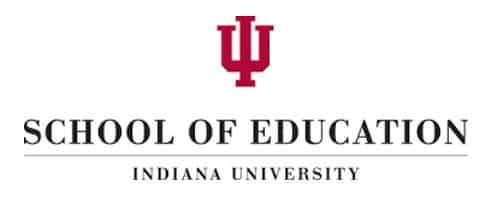 AACTE is delighted to announce Indiana University School of Education as the recipient of the 2020 AACTE Best Practice Award in Support of Global and International Perspectives for its K-16 Global Education Initiatives across Indiana program. Vesna Dimitrieska, coordinator, Global Education Initiatives at Indiana University School of Education and Hamilton Lugar School of Global and International Studies, will be recognized formally with the award at the AACTE 72nd Annual Meeting, February 28 – March 1, in Atlanta, GA.
AACTE is delighted to announce Indiana University School of Education as the recipient of the 2020 AACTE Best Practice Award in Support of Global and International Perspectives for its K-16 Global Education Initiatives across Indiana program. Vesna Dimitrieska, coordinator, Global Education Initiatives at Indiana University School of Education and Hamilton Lugar School of Global and International Studies, will be recognized formally with the award at the AACTE 72nd Annual Meeting, February 28 – March 1, in Atlanta, GA.
The uniqueness of Indiana University’s program lies in its structure as a joint program between its School of Education and its Hamilton Lugar School (HLS) of Global and International Studies, working collaboratively to create globally competent teachers. Hosted at the School of Education, the program ensures graduates enter the workforce with deep global knowledge and “strong fluency in the regional cultures, languages, and perspectives shaping our world.” By combining the resources that are available from the two schools, the program is providing equitable access to urban, suburban, and rural parts of Indiana and initiating, maintaining, and expanding partnerships with educators in schools from 18 different counties across the state.
10 Feb2020
By Jerrica Thurman
 AACTE has chosen an article by Amy Rector-Aranda, Ph.D. of Texas A&M University, the recipient of the 2020 AACTE Outstanding Journal of Teacher Education Article Award. Her article, “Critically Compassionate Intellectualism in Teacher Education: The Contributions of Relational-Cultural Theory,” was published in the September/October 2019 issue of the journal and will be recognized formally with the award at the AACTE 72nd Annual Meeting, February 28 – March 1, in Atlanta, GA.
AACTE has chosen an article by Amy Rector-Aranda, Ph.D. of Texas A&M University, the recipient of the 2020 AACTE Outstanding Journal of Teacher Education Article Award. Her article, “Critically Compassionate Intellectualism in Teacher Education: The Contributions of Relational-Cultural Theory,” was published in the September/October 2019 issue of the journal and will be recognized formally with the award at the AACTE 72nd Annual Meeting, February 28 – March 1, in Atlanta, GA.
In the article, Rector‐Aranda explores how the critically compassionate intellectualism framework might translate as a framework for teacher education. Educational theorists Cammarota and Romero describe critically compassionate intellectualism (CCI) as a trilogy of critical pedagogy, authentic caring, and social‐justice oriented curriculum used to lift up previously disempowered Latinx youth. Because the compassion element in CCI is understudied in teacher education, yet crucial to the success of the framework as a whole, Rector‐Aranda applies the tents of Relational‐Cultural Theory (RCT) to enhance understandings of this component. Based in feminist theories of psychosocial and moral development, RCT expands the original framework to account for varied experiences of privilege and vulnerability when applying CCI to teacher education while retaining core emphases on relationships, empathy, and associate aspects of authentic caring. This study makes a conceptual contribution by offering an integrated framework for teacher education.
10 Feb2020
By Jerrica Thurman
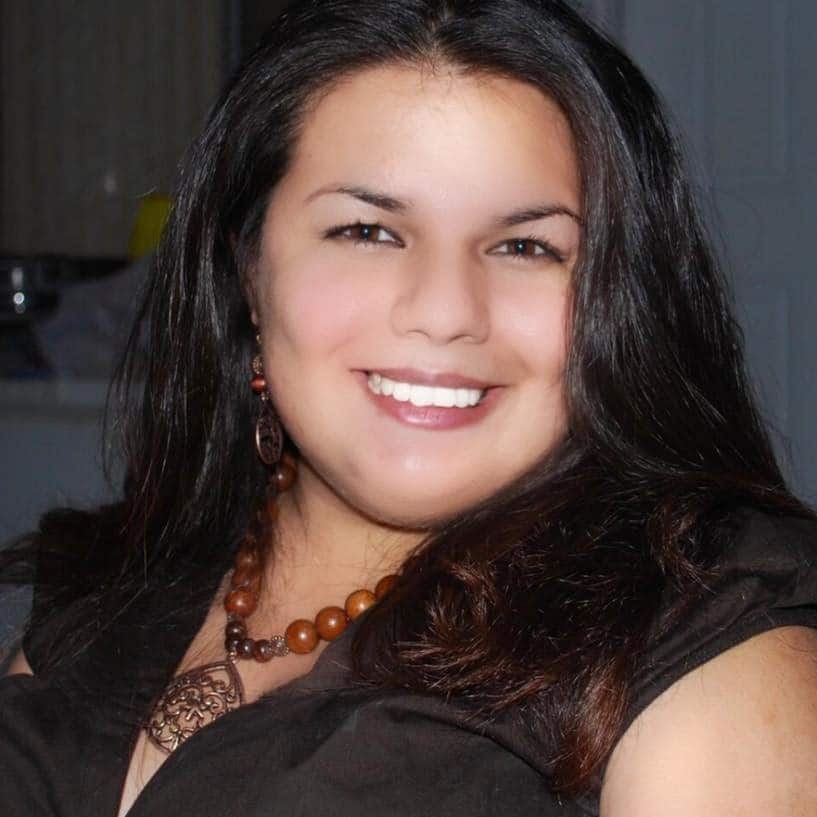 AACTE is delighted to announce Christina Restrepo Nazar, Ph.D. as the recipient of the 2020 AACTE Outstanding Dissertation Award for Youth as Teacher Educators: Supporting Preservice Teachers in the Developing Youth Centered, Equity-Oriented Science Teaching Practices. The author completed her dissertation for the Ph.D. at Michigan State University College of Education. She currently serves as assistant professor of K-12 science education in the Charter College of Education at California State University Los Angeles. She will be recognized formally with the award at the AACTE 72nd Annual Meeting, February 28 – March 1, in Atlanta, GA.
AACTE is delighted to announce Christina Restrepo Nazar, Ph.D. as the recipient of the 2020 AACTE Outstanding Dissertation Award for Youth as Teacher Educators: Supporting Preservice Teachers in the Developing Youth Centered, Equity-Oriented Science Teaching Practices. The author completed her dissertation for the Ph.D. at Michigan State University College of Education. She currently serves as assistant professor of K-12 science education in the Charter College of Education at California State University Los Angeles. She will be recognized formally with the award at the AACTE 72nd Annual Meeting, February 28 – March 1, in Atlanta, GA.
In her dissertation, Restrepo Nazar conducted three separate, but interrelated studies that examine the ways preservice teachers (PSTs) generatively developed youth-centered, equity-oriented pedagogical imaginaries in their methods courses and how they enacted these practice(s) in their field experiences. The purpose of this dissertation is to understand how and in what ways a science methods course can support PSTs in the critical uptake of youth (and community) knowledge(s) and practice(s) and how classroom communities in the field can shift/shape these enactments. In this work, Restrepo Nazar foregrounds youth counternarratives of the culture of power in science as a critical part of learning to teach science for PSTs—a study that has never been done before.
10 Feb2020
By Katrina Norfleet
 AACTE is delighted to announce Manhattanville College’s School of Education (SOE) in Purchase, N.Y. as the recipient of the 2020 AACTE Best Practice Award in Support of Multicultural Education and Diversity for its Changing Suburbs Institute® (CSI) program. Shelley Wepner, dean and professor, Manhattanville College of Education, will be recognized formally with the award at the AACTE 72nd Annual Meeting, February 28 – March 1, in Atlanta, GA.
AACTE is delighted to announce Manhattanville College’s School of Education (SOE) in Purchase, N.Y. as the recipient of the 2020 AACTE Best Practice Award in Support of Multicultural Education and Diversity for its Changing Suburbs Institute® (CSI) program. Shelley Wepner, dean and professor, Manhattanville College of Education, will be recognized formally with the award at the AACTE 72nd Annual Meeting, February 28 – March 1, in Atlanta, GA.
CSI is a grassroots, school-university-community collaborative that was established in recognition of the increasing diversity in suburban school districts and to ensure that practicing and prospective teachers are prepared to teach an increasingly diverse student population. Now in its fourteenth year, CSI focuses on four major areas: teacher leadership/development, collaboration, dissemination of information, and parent education. To address teacher leadership/development, CSI has established Professional Development Schools (PDS) in 16 schools across eight districts in Westchester County. Each PDS has a Leadership Team comprised of a faculty liaison, teachers, and school administrators.
06 Feb2020
By Amanda Morales
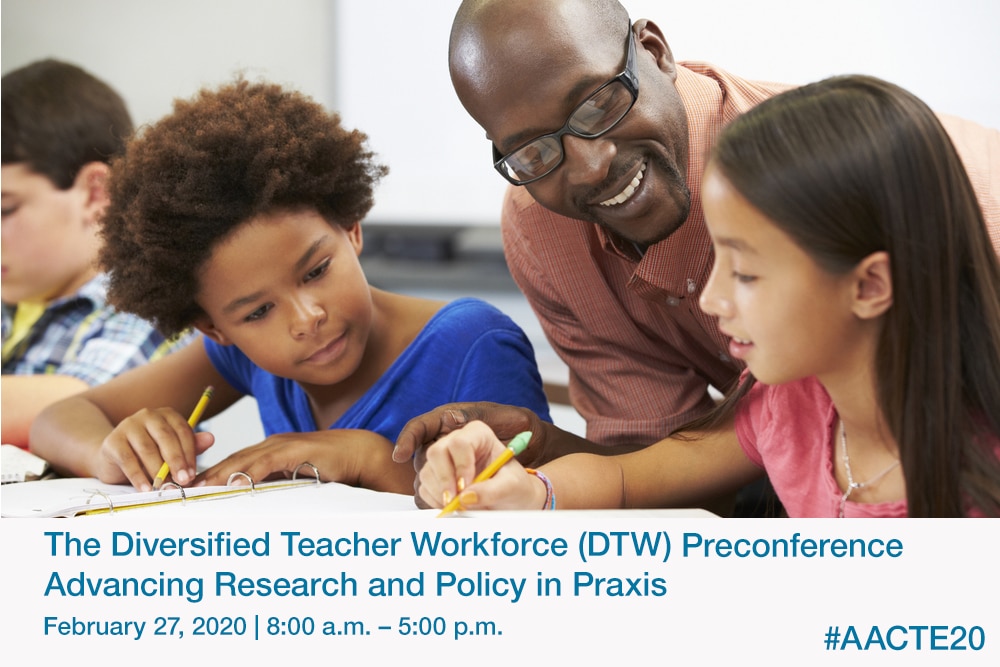 This year will mark the fourth year that ACCTE’s Diversified Teaching Workforce (DTW) Topical Action Group (TAG) will host a preconference Institute. This year’s Institute: Advancing Research and Policy in Praxis, will convene a group of national leaders from colleges and universities across the United States to spotlight and explore innovative efforts for addressing ethnoracial teacher diversity across the teacher development continuum. The preconference will take place February 27, 8:00 a.m. – 5:00 p.m.
This year will mark the fourth year that ACCTE’s Diversified Teaching Workforce (DTW) Topical Action Group (TAG) will host a preconference Institute. This year’s Institute: Advancing Research and Policy in Praxis, will convene a group of national leaders from colleges and universities across the United States to spotlight and explore innovative efforts for addressing ethnoracial teacher diversity across the teacher development continuum. The preconference will take place February 27, 8:00 a.m. – 5:00 p.m.
04 Feb2020
AACTE DEI Video: Building the Special Education Pipeline
By Katrina Norfleet
Ed Prep Matters features the “Revolutionizing Education” column to spotlight the many ways AACTE, member institutions, and partners are pioneering leading-edge research, models, strategies and programs that focus on the three core values outlined in the current AACTE strategic plan: Diversity, Equity, and Inclusion; Quality and impact; and Inquiry and Innovation.
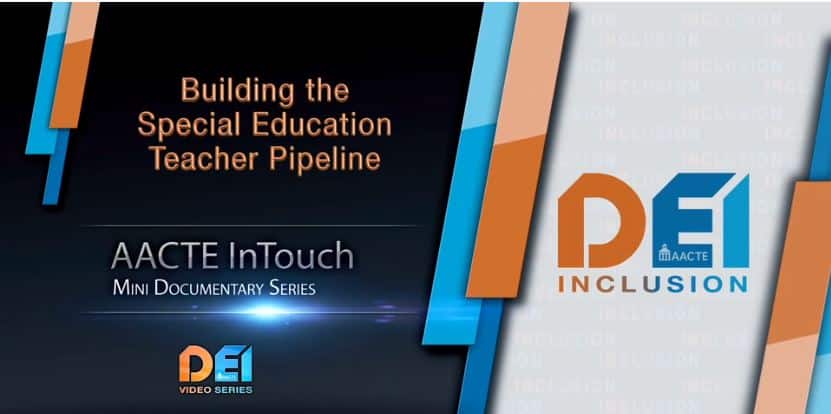
In the next segment of the AACTE Diversity, Equity and Inclusion video series, AACTE members address the critical shortage of special education teachers and how to ensure teachers can effectively serve students with disabilities. The video aligns with AACTE’s strategic priority to advocate for high-quality educator preparation and the inclusion of all students in equitable access and opportunity in PK-20 classrooms. In this DEI video, Building the Special Education Pipeline, leaders in educator preparation consider approaches to increasing the pool of highly qualified special education teachers.
30 Jan2020
A Look at Black Males and Education Using Critical Race Theory
By Kimberly White Smith and Quaylan Allen
Ed Prep Matters features the “Revolutionizing Education” column to spotlight the many ways AACTE, member institutions, and partners are pioneering leading-edge research, models, strategies and programs that focus on the three core values outlined in the current AACTE strategic plan: Diversity, Equity, and Inclusion; Quality and impact; and Inquiry and Innovation.
 Newly-elected AACTE Board member Kimberly A. White-Smith and her colleague Quaylan Allen published the following two studies in Urban Education and Equity & Excellence in Education in which they examine practices that influence the education of black males in the United States. The studies are summarized in the abstracts below with links to the full articles.
Newly-elected AACTE Board member Kimberly A. White-Smith and her colleague Quaylan Allen published the following two studies in Urban Education and Equity & Excellence in Education in which they examine practices that influence the education of black males in the United States. The studies are summarized in the abstracts below with links to the full articles.
“That’s Why I Say Stay in School”: Black Mothers’ Parental Involvement, Cultural Wealth, and Exclusion in Their Son’s Schooling
This study examines parental involvement practices, the cultural wealth, and school experiences of poor and working-class mothers of Black boys. Drawing upon data from an ethnographic study, we examine qualitative interviews with four Black mothers. Using critical race theory and cultural wealth frameworks, we explore the mothers’ approaches to supporting their sons’ education. We also describe how the mothers and their sons experienced exclusion from the school, and how this exclusion limited the mothers’ involvement. We highlight their agency in making use of particular forms of cultural wealth in responding to the school’s failure of their sons.
“Just as Bad as Prisons”: The Challenge of Dismantling the School-to-Prison Pipeline Through Teacher and Community Education
Drawing upon the authors’ experiences working in schools as teachers, teacher educators, researchers, and community members, this study utilizes a Critical Race Theory of education in examining the school-to-prison pipeline for black male students. In doing so, the authors highlight the particular role educators play in the school-to-prison pipeline, focusing particularly on how dispositions toward black males influence educator practices. Recommendations and future directions are provided on how education preparation programs can play a critical role in the transformation of black male schooling.
If you would like to share your story about how your institution or organization is revolutionizing approaches to Diversity, Equity, and Inclusion; Quality and Impact; and Inquiry and Innovation, please contact Katrina Norfleet at knorfleet@aacte.org.
16 Jan2020
AACTE’s DEI Video on The Importance of Culturally Relevant Teaching
By Jerrica Thurman

Ed Prep Matters features the “Revolutionizing Education” column to spotlight the many ways AACTE, member institutions, and partners are pioneering leading-edge research, models, strategies and programs that focus on the three core values outlined in the current AACTE strategic plan: Diversity, Equity, and Inclusion; Quality and impact; and Inquiry and Innovation.
The next segment of the AACTE Diversity, Equity and Inclusion video series features AACTE’s strategic priority to advocate for high-quality educator preparation. Equitable access to education for students from all cultures requires teachers to use knowledge, frame of references, and performance styles of ethnically diverse students to make learning more relevant and effective to them. In AACTE’s DEI video, “The Importance of Culturally Relevant Teaching,” leading educators discuss a teaching pedagogy that affirms students’ differences and diversity.
20 Dec2019
By Jane E. West

This blog post is written by AACTE consultant Jane West and is intended to provide updated information. The views expressed in this post do not necessarily reflect the views of AACTE
Congress Delivers a Big Christmas Present – and On Time!
Republicans and Democrats in the House and the Senate came together to have bipartisan votes in both bodies to pass two packages of funding bills, which will keep all of the federal government running. President Trump has indicated that he will sign the bills today, thus preventing another government shutdown.
Some key points about the education portion of the bill:
- It adds $1.3 billion in spending for education over FY 2019.
- The Department of Education’s budget now totals $72.8 Billion.
- Virtually no program received a cut in funding and many received substantial increases.
- The largest increases went to Title I ($450 million) and IDEA Part B ($400 million).
- Related programs in HHS received large increases as well, for example Head Start has a $500 million increase.
- A new Social Emotional Learning initiative received $123 million.
- Many minority serving institutions in higher education received considerable increases including an $11 million increase for HBCU graduate institutions.
- For the first time in years funding for research on gun violence prevention is provided at $25 million (for CDC and NIH).
18 Dec2019
By Marvin Lynn

Freedom of speech is an ideal to which those who founded this country believed in. I recall President Barack Obama’s many talks about the “American Ideals” of freedom, justice, and liberty, which I believe, includes free speech. Inherent in President Obama’s message was the notion that these ideals were not fully realized by historically marginalized communities in the United States. The current climate of our society further challenges our ability to see “freedom of speech” as something that is unifying rather than polarizing. This has become an increasingly important topic in higher education. The Chronicle of Higher Education, for example, continuously highlights issues regarding the intersection of free speech and civil discourse that are impacting education in unprecedented ways.
13 Dec2019
AACTE’s DEI Video: Helping Students of Color Pursue Careers in Education
By Jerrica Thurman
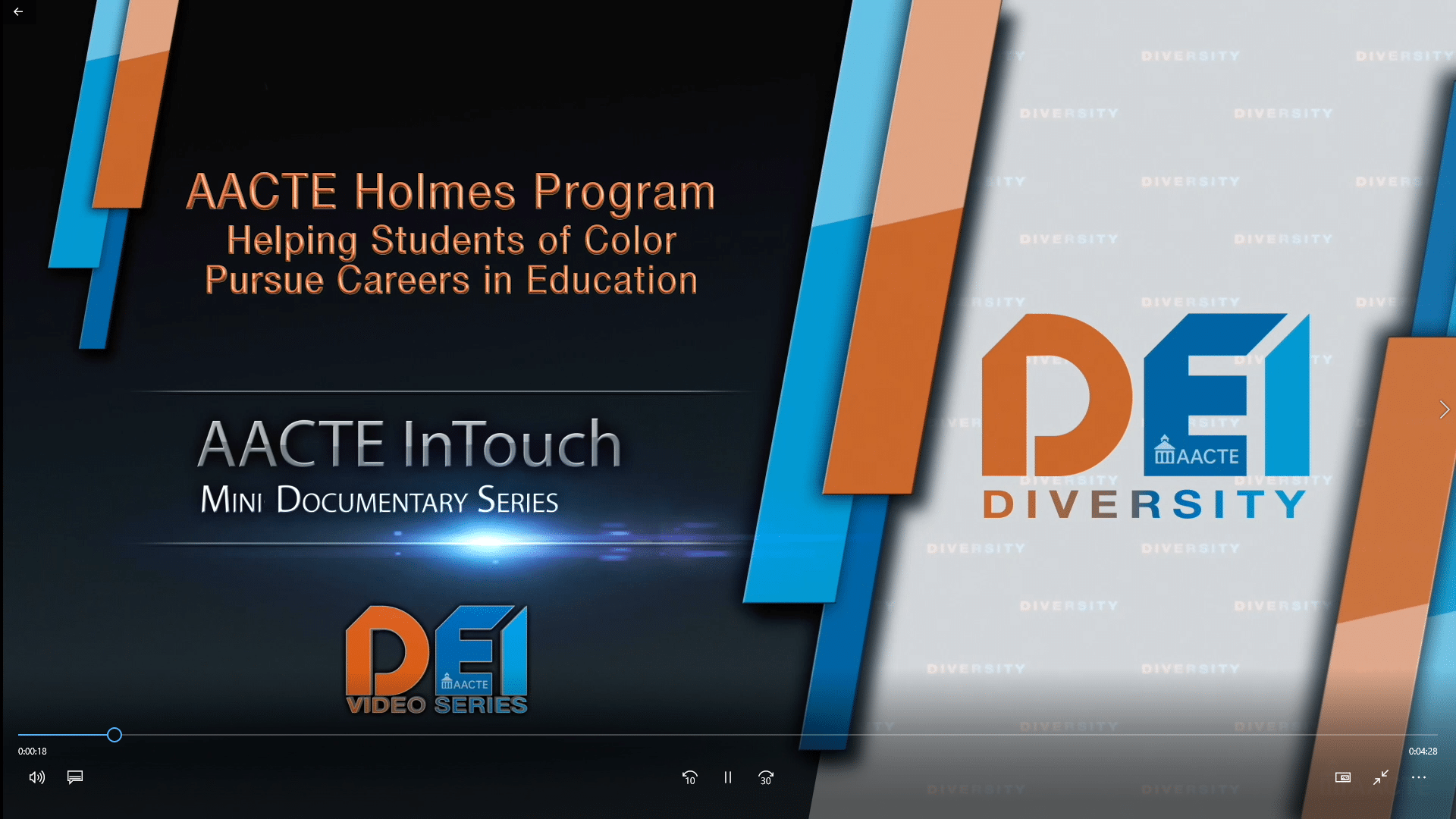
Ed Prep Matters features the “Revolutionizing Education” column to spotlight the many ways AACTE, member institutions, and partners are pioneering leading-edge research, models, strategies and programs that focus on the three core values outlined in the current AACTE strategic plan: Diversity, Equity, and Inclusion; Quality and Impact; and Inquiry and Innovation.
AACTE is excited to feature its Holmes Program as part of the new Diversity, Equity and Inclusion in Educator Preparation video series. For nearly 30 years, the AACTE Holmes Program has supported students who self-identify as racially and ethnically diverse and are obtaining graduate degrees in education at AACTE member institutions.
09 Dec2019
By Patricia Alvarez McHatton
Racist Curricula in the 21st Century Do Exist
Any curriculum, even the most enlightened, has traces of racism. This is simply because we all have biases that come through in multiple ways. Our responsibility as educators is to be critically self-reflective and continuously monitor ourselves, our work, and our interactions with both the students we teach and those around us.
Invariably, believing we are culturally and linguistically responsive and sustaining is an indication that we still have work to do. This is because we are always in a state of becoming. New experiences and knowledge expand our ways of thinking and intersect with our lived experiences making the familiar strange. This is true for individuals and curriculum. That is why continuous critical self-reflection is essential as it affords us the opportunity to negotiate uncomfortable and challenging spaces, experiences, and interactions. It is through this disruption that we learn.
06 Dec2019
Augusta University on a Mission to Recruit More African American Male Teachers
By Stacey Eidson
Ed Prep Matters features the “Revolutionizing Education” column to spotlight the many ways AACTE, member institutions, and partners are pioneering leading-edge research, models, strategies and programs that focus on the three core values outlined in the current AACTE strategic plan: Diversity, Equity, and Inclusion; Quality and Impact; and Inquiry and Innovation.
This article originally appeared in JagWire and is reprinted with permission.
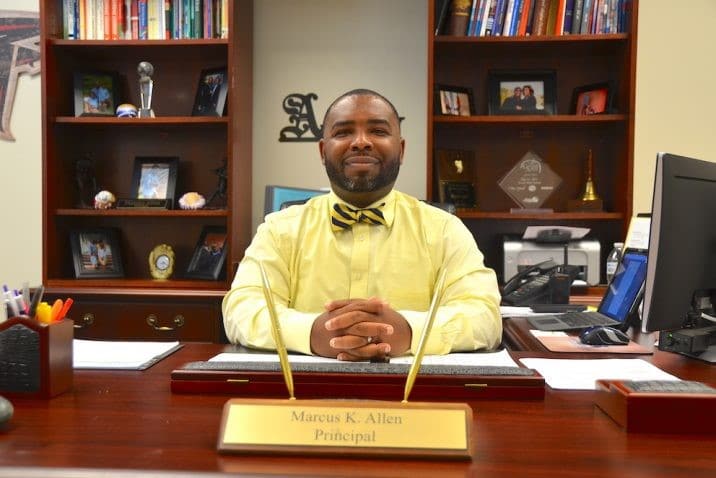
Growing up in Elberton, Georgia, Marcus Allen had a lot of incredible teachers who inspired him to be the man he is today.
They were thoughtful, patient and caring, but Allen, who is now the principal of Grovetown Middle School in Columbia County, admits there was one major component missing throughout his childhood education.
“Back then, I didn’t see people who looked like me teaching,” Allen said. “I didn’t have any African American male teachers at my school. And I think it’s important for students to be able to see someone who they can relate to in the classroom. Somebody who they can say, ‘He really might be able to advocate for me.’”
 As the AACTE 72nd Annual Meeting theme suggests, decades of societal inequities extending into and from our P-16 institutional environments have left us hungry for change. Persistent achievement gap disparities and teacher shortages trouble us and often make us wonder how we will achieve the changes we seek. In terms of teacher diversity, one solution that many have found are the Educator Preparation programs at Historically Black Colleges and Universities (HBCUs). While making up only 3% of the nation’s higher education institutions, HBCUs provide over 50% of the nation’s African American teachers.
As the AACTE 72nd Annual Meeting theme suggests, decades of societal inequities extending into and from our P-16 institutional environments have left us hungry for change. Persistent achievement gap disparities and teacher shortages trouble us and often make us wonder how we will achieve the changes we seek. In terms of teacher diversity, one solution that many have found are the Educator Preparation programs at Historically Black Colleges and Universities (HBCUs). While making up only 3% of the nation’s higher education institutions, HBCUs provide over 50% of the nation’s African American teachers.






 AACTE is delighted to announce
AACTE is delighted to announce  AACTE has chosen an article by Amy Rector-Aranda, Ph.D. of Texas A&M University, the recipient of the 2020 AACTE Outstanding Journal of Teacher Education Article Award. Her article, “
AACTE has chosen an article by Amy Rector-Aranda, Ph.D. of Texas A&M University, the recipient of the 2020 AACTE Outstanding Journal of Teacher Education Article Award. Her article, “ AACTE is delighted to announce Christina Restrepo Nazar, Ph.D. as the recipient of the 2020 AACTE Outstanding Dissertation Award for Youth as Teacher Educators: Supporting Preservice Teachers in the Developing Youth Centered, Equity-Oriented Science Teaching Practices. The author completed her dissertation for the Ph.D. at Michigan State University College of Education. She currently serves as assistant professor of K-12 science education in the Charter College of Education at California State University Los Angeles. She will be recognized formally with the award at the
AACTE is delighted to announce Christina Restrepo Nazar, Ph.D. as the recipient of the 2020 AACTE Outstanding Dissertation Award for Youth as Teacher Educators: Supporting Preservice Teachers in the Developing Youth Centered, Equity-Oriented Science Teaching Practices. The author completed her dissertation for the Ph.D. at Michigan State University College of Education. She currently serves as assistant professor of K-12 science education in the Charter College of Education at California State University Los Angeles. She will be recognized formally with the award at the  AACTE is delighted to announce
AACTE is delighted to announce  This year will mark the fourth year that ACCTE’s Diversified Teaching Workforce (DTW) Topical Action Group (TAG) will host a preconference Institute. This year’s Institute: Advancing Research and Policy in Praxis, will convene a group of national leaders from colleges and universities across the United States to spotlight and explore innovative efforts for addressing ethnoracial teacher diversity across the teacher development continuum. The preconference will take place February 27, 8:00 a.m. – 5:00 p.m.
This year will mark the fourth year that ACCTE’s Diversified Teaching Workforce (DTW) Topical Action Group (TAG) will host a preconference Institute. This year’s Institute: Advancing Research and Policy in Praxis, will convene a group of national leaders from colleges and universities across the United States to spotlight and explore innovative efforts for addressing ethnoracial teacher diversity across the teacher development continuum. The preconference will take place February 27, 8:00 a.m. – 5:00 p.m.
 Newly-elected AACTE Board member Kimberly A. White-Smith and her colleague Quaylan Allen published the following two studies in Urban Education and Equity & Excellence in Education in which they examine practices that influence the education of black males in the United States. The studies are summarized in the abstracts below with links to the full articles.
Newly-elected AACTE Board member Kimberly A. White-Smith and her colleague Quaylan Allen published the following two studies in Urban Education and Equity & Excellence in Education in which they examine practices that influence the education of black males in the United States. The studies are summarized in the abstracts below with links to the full articles.



